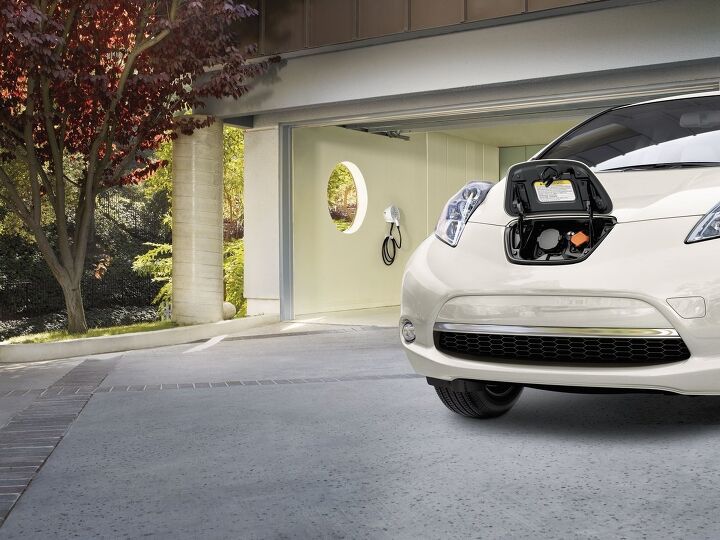Everyone Leases Electric Vehicles Because the Next Crop Will Always Be Better

The automotive industry frames electric vehicles as the future of motoring, but despite a large number of plug-in options already available, the entire idea of owning an electric car is still rather futuristic. Leasing one, however, is far more contemporary.
Growing in popularity, automotive leasing hit a record high in 2016, accounting for 31 percent of all new vehicle sales in the United States. But that’s nothing when you isolate the number of electric cars. U.S. drivers now lease nearly 80 percent of battery-electric vehicles and 55 percent of all plug-in hybrids. Accounting for this trend is a consumer perception that EVs will only get better over time — which isn’t all that different from saying the current fleet isn’t all that impressive.
This hypothesis gains further credence when one considers the small market share of electric vehicles. Globally, EVs only account for around one percent of new vehicle deliveries. After speaking with Chevrolet Bolt lessee Jeffrey Jablansky, Bloomberg figures consumers are simply waiting on a better example of electrification .
“I just think in three years I’m going to be delighted at what else is available,” said Jablansky, a freelance autowriter. “And we’re going to laugh one day that we used to plug cars in for eight hours at a time.”
We’re in agreement. Why would you want to settle down with a model you know will have an inferior range and charging time compared to whatever manufacturers have next on the schedule? Combine that knowledge with the abysmal resale value of battery-electric vehicles and the decision is pretty easy. Leasing typically makes more sense.
“When there’s new technology coming out, and it’s coming out so rapidly, and you’re improving on it so constantly, typically people only want to lease it,” Steve Center, vice president of American Honda, said at last year’s New York Auto Show.
Honda doesn’t even allow people to purchase its hydrogen fuel cell variant of the Clarity for that very reason. It can only be leased. “Think of your cell phone,” Center explained.
The mobile phone analogy is an astute one. Consider how incredibly modern your cellular device was when you initially took ownership and how antiquated and trashy it felt just a few years later. Now apply that same thinking to a device that costs sixty times more. The only real difference is that smartphones actually appear to hold their value better than BEVs.
According to Black Book, electric compact cars sold in 2014 are now averaging roughly 23 percent of their original sticker price, compared with 41 percent for comparable internal combustion vehicles. “The buyer of a used EV today is as much an early adopter as the buyer of a new EV was in 2011,” said Nicholas Albanese, an analyst with Bloomberg New Energy Finance.
Be that as it may, we still appreciate those early early adopters for testing the waters and taking the financial risk for the rest us.
[Image: Nissan]

A staunch consumer advocate tracking industry trends and regulation. Before joining TTAC, Matt spent a decade working for marketing and research firms based in NYC. Clients included several of the world’s largest automakers, global tire brands, and aftermarket part suppliers. Dissatisfied with the corporate world and resentful of having to wear suits everyday, he pivoted to writing about cars. Since then, that man has become an ardent supporter of the right-to-repair movement, been interviewed on the auto industry by national radio broadcasts, driven more rental cars than anyone ever should, participated in amateur rallying events, and received the requisite minimum training as sanctioned by the SCCA. Handy with a wrench, Matt grew up surrounded by Detroit auto workers and managed to get a pizza delivery job before he was legally eligible. He later found himself driving box trucks through Manhattan, guaranteeing future sympathy for actual truckers. He continues to conduct research pertaining to the automotive sector as an independent contractor and has since moved back to his native Michigan, closer to where the cars are born. A contrarian, Matt claims to prefer understeer — stating that front and all-wheel drive vehicles cater best to his driving style.
More by Matt Posky
Latest Car Reviews
Read moreLatest Product Reviews
Read moreRecent Comments
- SCE to AUX Figure 160 miles EPA if it came here, minus the usual deductions.It would be a dud in the US market.
- Analoggrotto EV9 sales are rivalling the Grand Highlander's and this is a super high eATP vehicle with awesome MSRPs. Toyota will need to do more than compete with a brand who has major equity and support from the automotive journalism community. The 3 row game belongs to HMC with the Telluride commanding major marketshare leaps this year even in it's 5th hallowed year of ultra competitive sales.
- Analoggrotto Probably drives better than Cprescott
- Doug brockman I havent tried the Honda but my 2023 RAV4 is great. I had a model 20 years ago which. Was way too little
- Master Baiter The picture is of a hydrogen fuel cell vehicle.


































Comments
Join the conversation
And in the case of the Leaf, less ugly.
Depreciation and battery health. A 2011 Leaf with 4 bars of battery gone and out of warranty means it lost probably 1/3 of its range, and is no longer good enough for a lot of people's commute in cold weather, EVEN IF THEY CAN CHARGE AT WORK. Since getting into carpool lane by yourself is the biggest (maybe other than free charging at work) reason to get an EV, you should just keep leasing new EV and let someone take the used one if they can use it for short commute, or as a teenager car. A $30k EV for $5k after 1/3 of the range is gone sounds quite scary and awesome, depends on who you ask.